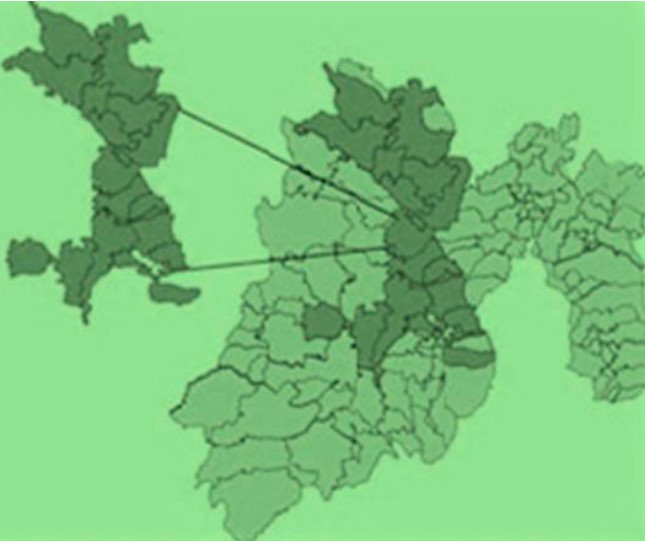Rescue of traditional agricultural knowledge in the ñätho hñähñu
DOI:
https://doi.org/10.29312/remexca.v13i4.3201Keywords:
agricultural, biocultural, knowledge, OtomiAbstract
The ñätho hñähñu are an ancient people and legitimate owners of the territories that today comprise the center and north of the State of Mexico, over the centuries they forge a way of life reciprocal and complementary with their environment, creating a worldview integrated into their territory and a complex system of symbols that give rise to their language, an essential element of their biocultural heritage and their knowledge that make it possible to structure the system of agricultural knowledge and develop the milpa and the backyard -Huähi ne Nxutahngu- and integrate them into their environment as an irreplaceable agroecological unit, in harmony with their worldview and consistent supplier of foods, medicines and raw materials, the study was conducted in March and September 2017 and 2018. The agricultural praxis of the Otomi is based on the rescue and reappraisal of their technical knowledge, built and validated based on accumulated experiences as means to overcome climatological and geographical conditions, guarantee their survival and reproduce as a society in a territory. That is, the system of symbols allows them to be collectivized in individual action by transferring the knowledge not only from the old man -Xhita- to children and grandchildren, but between families and localities of the same ethnicity, validating and collectivizing its social function.
Downloads
References
Aldana, R. 2000. Castells, la era de la información. realidades y reflexiones sobre la globalización. Espiral. México, DF.
Bartra, V. A. 2010. Campesindios. Aproximaciones a los campesinos de un continente colonizado. La Nación. México, DF.
Boege, E. 2010. El Patrimonio biocultural de los pueblos indígenas de México. Instituto Nacional de Antropología e Historia (INAH). México, DF.
Cornejo, M.; Besoaín, C. y Mendoza, F. 2011. Desafíos en la generación de conocimiento en la investigación social cualitativa contemporánea. Forum. Qualitative Social Research. 12 p.
Dussel, E. 1998. Ética de la liberación en la edad de la globalización y de la exclusión. Trota. España. DOI: https://doi.org/10.7202/401177ar
Garrido, V. L. 2011. Habermas y la teoría de la acción comunicativa. razón y palabra. México, DF.
Geertz, C. 2003. La interpretación de las culturas. Gedisa (Ed.). España.
Habermas, J. 2003. Acción comunicativa y razón sin trascendencia. Paidós. España.
Kobialka, A. 2014. El proyecto de Habermas en ciencia y técnica como ideología y sus legados en la búsqueda de una sociedad más justa. Ensenada, Argentina.
Mélich, J. C. 1998. Antropología simbólica y acción educativa. Paidós. Barcelona, España.
Torres, C. G. 2017. Sustentabilidad y compatibilidad. Universidad Autónoma Chapingo (UACH). Texcoco, Estado de México.

Published
How to Cite
Issue
Section
License
Copyright (c) 2022 Revista Mexicana de Ciencias Agrícolas

This work is licensed under a Creative Commons Attribution-NonCommercial 4.0 International License.
The authors who publish in Revista Mexicana de Ciencias Agrícolas accept the following conditions:
In accordance with copyright laws, Revista Mexicana de Ciencias Agrícolas recognizes and respects the authors’ moral right and ownership of property rights which will be transferred to the journal for dissemination in open access. Invariably, all the authors have to sign a letter of transfer of property rights and of originality of the article to Instituto Nacional de Investigaciones Forestales, Agrícolas y Pecuarias (INIFAP) [National Institute of Forestry, Agricultural and Livestock Research]. The author(s) must pay a fee for the reception of articles before proceeding to editorial review.
All the texts published by Revista Mexicana de Ciencias Agrícolas —with no exception— are distributed under a Creative Commons License Attribution-NonCommercial 4.0 International (CC BY-NC 4.0), which allows third parties to use the publication as long as the work’s authorship and its first publication in this journal are mentioned.
The author(s) can enter into independent and additional contractual agreements for the nonexclusive distribution of the version of the article published in Revista Mexicana de Ciencias Agrícolas (for example include it into an institutional repository or publish it in a book) as long as it is clearly and explicitly indicated that the work was published for the first time in Revista Mexicana de Ciencias Agrícolas.
For all the above, the authors shall send the Letter-transfer of Property Rights for the first publication duly filled in and signed by the author(s). This form must be sent as a PDF file to: revista_atm@yahoo.com.mx; cienciasagricola@inifap.gob.mx; remexca2017@gmail.
This work is licensed under a Creative Commons Attribution-Noncommercial 4.0 International license.


